Whether you've accidentally bumped into someone on the busy streets of Paris, arrived late to a meeting in Montreal, or made a faux pas at a dinner party in Brussels, knowing how to apologize in French can smooth over many awkward situations. How do you say sorry in french?
In this comprehensive guide, we'll explore 75 diverse ways to apologize in French, from formal "je suis désolé(e)" to casual "pardon" and everything in between.
We'll cover when and how to use each phrase, ensuring you're equipped to express regret confidently in any situation – be it a formal business setting or a casual encounter with friends.
When is "Sorry" used in French?
In French culture, the use of apologies differs somewhat from English-speaking cultures, particularly in terms of frequency and context.
Understanding these differences can help you navigate social situations more effectively in French-speaking environments.
Frequency of apologies
French speakers generally use explicit apologies less frequently than English speakers. This doesn't stem from a lack of politeness, but rather from different cultural norms around what situations warrant a verbal apology.
-
In English-speaking cultures, "sorry" is often used as a general courtesy word, even in situations where no real offense has occurred.
-
In French culture, apologies are typically reserved for more significant transgressions or inconveniences.
For instance, while an English speaker might say "sorry" when reaching past someone in a supermarket, a French speaker might simply say "Pardon" or even just "Hop" as they reach.
Contexts for apologies
Here are some key situations where apologies are commonly used in French culture:
-
Genuine mistakes or inconveniences : When you've truly inconvenienced someone or made a mistake, e.g., "Je suis désolé(e) pour le retard" (I'm sorry for being late).
-
Formal settings : In professional or formal social situations, apologies are more readily expressed, e.g., "Veuillez m'excuser pour ce désagrément" (Please excuse me for this inconvenience).
-
Physical contact : When accidentally bumping into someone, a quick "Pardon" is expected.
If the person is almost the same age with you, or you're older than them or familiar, best friend of yours, you can say "je te demande pardon" .
-
Delivering bad news : When you have to communicate something unpleasant, e.g., "Je suis navré(e) de vous informer que..." (I'm sorry to inform you that...).
-
Interruptions : When interrupting someone speaking, e.g., "Excusez-moi de vous interrompre, mais..." (Excuse me for interrupting, but...).
Comparison with English-speaking cultures
-
Reflexive apologies : English speakers often use "sorry" reflexively in situations where French speakers wouldn't, such as when asking for directions or the time.
-
Empathetic apologies : The English phrase "I'm sorry to hear that" is less common in French. Instead, French speakers might express sympathy differently, like "C'est dommage" (That's too bad) or "Ça me fait de la peine" (That saddens me).
-
Apologizing for others : In English, it's common to apologize on behalf of others (e.g., "Sorry about the weather"). This is less common in French culture.
Cultural nuances in French apologies
-
Action over words : French culture often values actions to remedy a situation more than verbal apologies. Offering a solution or compensation can be seen as more meaningful than simply saying "sorry."
-
Formality levels : The choice between "tu" and "vous" forms is crucial in apologies, reflecting the relationship between the speakers and the formality of the situation.
-
Explanation is key : When apologizing in French, it's common to provide a brief explanation. However, overly long explanations can be seen as making excuses.
-
Non-verbal communication : Tone of voice and body language play a significant role in conveying sincerity in French apologies.
-
Avoiding over-apologizing : Repeated apologies for the same issue can be seen as insincere or annoying in French culture. Once is usually enough.
-
Regional variations : The approach to apologies can vary in different French-speaking regions. Some cultural tips are needed. For example, Québécois French tends to use "Je m'excuse" more readily than Metropolitan French.
How to say sorry in French in 75 ways
Expressing regret in French goes far beyond a simple "désolé". The way you apologize can vary greatly depending on the formality of the situation, your relationship with the person, and the severity of the offense.
Let's explore the myriad ways to say sorry in French, starting with formal expressions and moving on to more casual ones.
Formal ways to say sorry in French

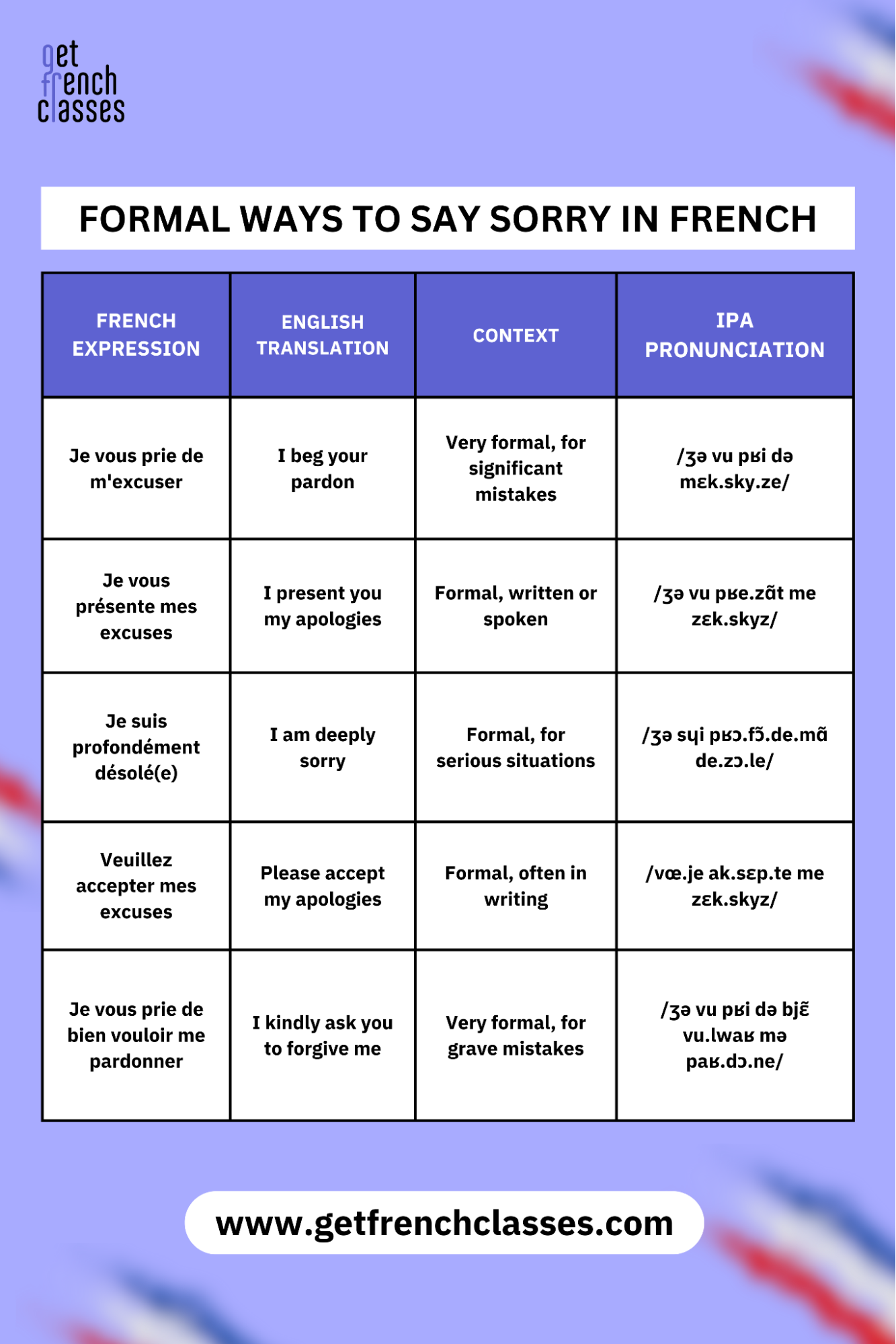
In formal situations, such as business meetings, official events, or when addressing people you don't know well or who are in positions of authority, it's important to use more polite and elaborate expressions of apology in french.
| French Expression | English Translation | Context | IPA Pronunciation |
|---|---|---|---|
| Je vous prie de m'excuser | I beg your pardon | Very formal, for significant mistakes | /ʒə vu pʁi də mɛk.sky.ze/ |
| Je vous présente mes excuses | I present you my apologies | Formal, written or spoken | /ʒə vu pʁe.zɑ̃t me zɛk.skyz/ |
| Je suis profondément désolé(e) | I am deeply sorry | Formal, for serious situations | /ʒə sɥi pʁɔ.fɔ̃.de.mɑ̃ de.zɔ.le/ |
| Veuillez accepter mes excuses | Please accept my apologies | Formal, often in writing | /vœ.je ak.sɛp.te me zɛk.skyz/ |
| Je vous prie de bien vouloir me pardonner | I kindly ask you to forgive me | Very formal, for grave mistakes | /ʒə vu pʁi də bjɛ̃ vu.lwaʁ mə paʁ.dɔ.ne/ |
1 - In a business meeting, if you've presented incorrect information: " Je vous prie de m'excuser pour cette erreur. Je vais immédiatement corriger ces chiffres. " ( I beg your pardon for this error. I will immediately correct these figures. )
This formal apology acknowledges the mistake and offers a solution, which is important in professional settings.
2 - After missing an important deadline: " Je vous présente mes excuses pour ce retard. Cela ne se reproduira plus. " ( I present you my apologies for this delay. It won't happen again. )
This formal expression takes responsibility for the mistake and provides assurance for the future, which is crucial in maintaining professional relationships.
3 - In a formal letter addressing a serious issue:
" Je suis profondément désolé(e) pour les désagréments que cette situation a pu vous causer. " ( I am deeply sorry for any inconvenience this situation may have caused you. )
This expression conveys a deep sense of regret and is suitable for more serious situations in formal contexts.
Casual and everyday sorry expressions in French

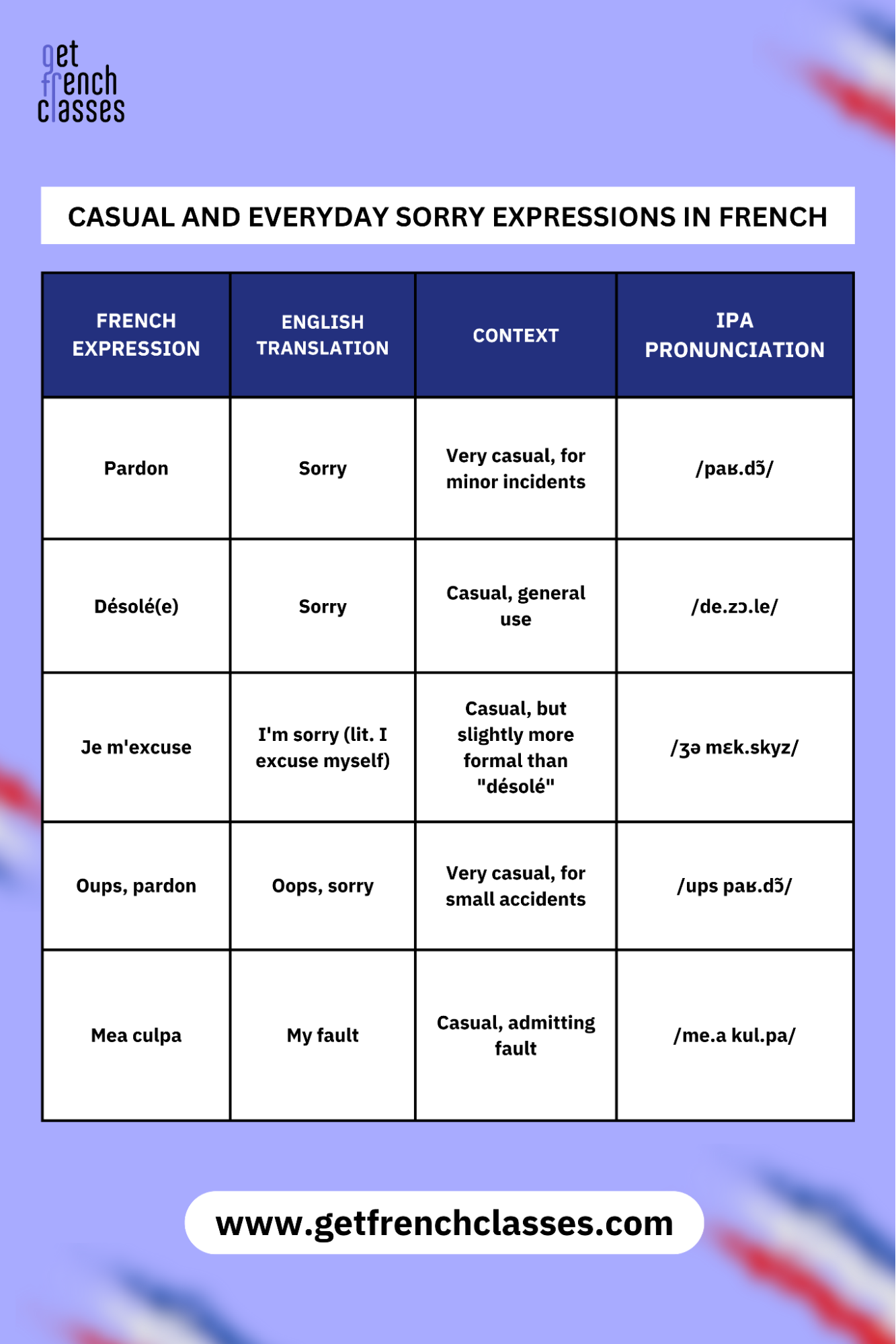

For everyday situations with friends, family, or in informal settings, you can use more relaxed expressions to apologize. These casual apologies are perfect for minor mishaps or everyday mistakes.
| French Expression | English Translation | Context | IPA Pronunciation |
|---|---|---|---|
| Pardon | Sorry | Very casual, for minor incidents | /paʁ.dɔ̃/ |
| Désolé(e) | Sorry | Casual, general use | /de.zɔ.le/ |
| Je m'excuse | I'm sorry (lit. I excuse myself) | Casual, but slightly more formal than "désolé" | /ʒə mɛk.skyz/ |
| Oups, pardon | Oops, sorry | Very casual, for small accidents | /ups paʁ.dɔ̃/ |
| Mea culpa | My fault | Casual, admitting fault | /me.a kul.pa/ |
Examples and explanations:
-
Bumping into someone on the street:
" Oh, pardon ! " ( Oh, sorry! )
"Pardon" is a quick and casual way to apologize for minor incidents. It's often used reflexively in situations like this.
2. Arriving a few minutes late to meet a friend:
Désolé(e) pour le retard, le métro était en panne. Sorry for being late, the metro broke down.
"Désolé(e)" is a versatile, casual apology that can be used in many everyday situations. Adding an explanation can help, but keep it brief.
3. Interrupting someone during a conversation:
Je m'excuse de vous interrompre, mais... I'm sorry to interrupt you, but...
" Je m'excuse" literally means "I apologize" . And it is slightly more formal than "désolé" or "excuse moi" but still appropriate for everyday use. It's a good choice when you need to interrupt or inconvenience someone.
4. Accidentally knocking over someone's drink:
Oups, pardon ! Je vais t'en racheter un. Oops, sorry! I'll buy you another one.
Combining "oups" with "pardon" emphasizes the accidental nature of the mistake. Offering to fix the problem is a nice gesture in such situations.
Remember, in French culture, the appropriate level of formality in your apology can be just as important as the apology itself. Always consider your relationship with the person and the severity of the situation when choosing how to say sorry.
Expressing deep regret in French apologies
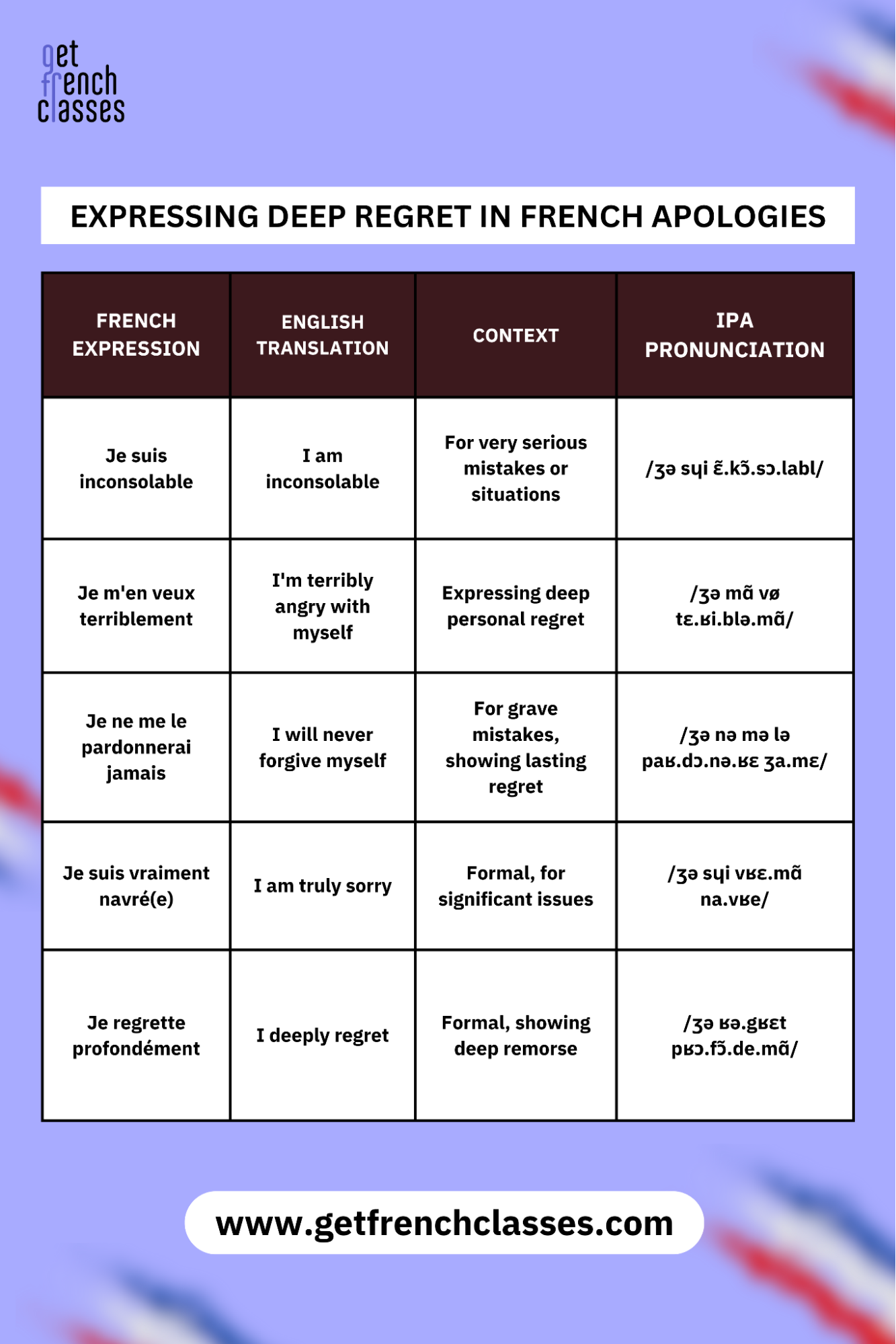
When you need to convey sincere remorse or apologize for more serious matters, French offers several heartfelt expressions. These phrases are perfect for expressing deep regret and showing genuine contrition.
| French Expression | English Translation | Context | IPA Pronunciation |
|---|---|---|---|
| Je suis inconsolable | I am inconsolable | For very serious mistakes or situations | /ʒə sɥi ɛ̃.kɔ̃.sɔ.labl/ |
| Je m'en veux terriblement | I'm terribly angry with myself | Expressing deep personal regret | /ʒə mɑ̃ vø tɛ.ʁi.blə.mɑ̃/ |
| Je ne me le pardonnerai jamais | I will never forgive myself | For grave mistakes, showing lasting regret | /ʒə nə mə lə paʁ.dɔ.nə.ʁɛ ʒa.mɛ/ |
| Je suis vraiment navré(e) | I am truly sorry | Formal, for significant issues | /ʒə sɥi vʁɛ.mɑ̃ na.vʁe/ |
| Je regrette profondément | I deeply regret | Formal, showing deep remorse | /ʒə ʁə.gʁɛt pʁɔ.fɔ̃.de.mɑ̃/ |
Examples and cultural context:
-
After a major misunderstanding that hurt a close friend:
Je suis inconsolable d'avoir pu te blesser ainsi. J'espère que tu pourras me pardonner. I am inconsolable for having hurt you like this. I hope you can forgive me.
In French culture, expressing such deep emotion is reserved for truly serious situations. This level of deep apology acknowledges the gravity of the offense and the depth of one's regret.
2. When you've made a significant error at work:
Je m'en veux terriblement pour cette erreur. Je vais faire tout mon possible pour la corriger. I'm terribly angry with myself for this error. I will do everything possible to correct it.
This expression shows that you're taking full responsibility for your actions, which is highly valued in French professional settings.
3. After betraying someone's trust:
Je ne me le pardonnerai jamais d'avoir trahi ta confiance. Je ferai tout pour la regagner. I will never forgive myself for betraying your trust. I'll do everything to regain it.
In French culture, trust is highly valued, and this expression conveys the lasting impact of one's actions on their own conscience.
French apology slang and youth expressions
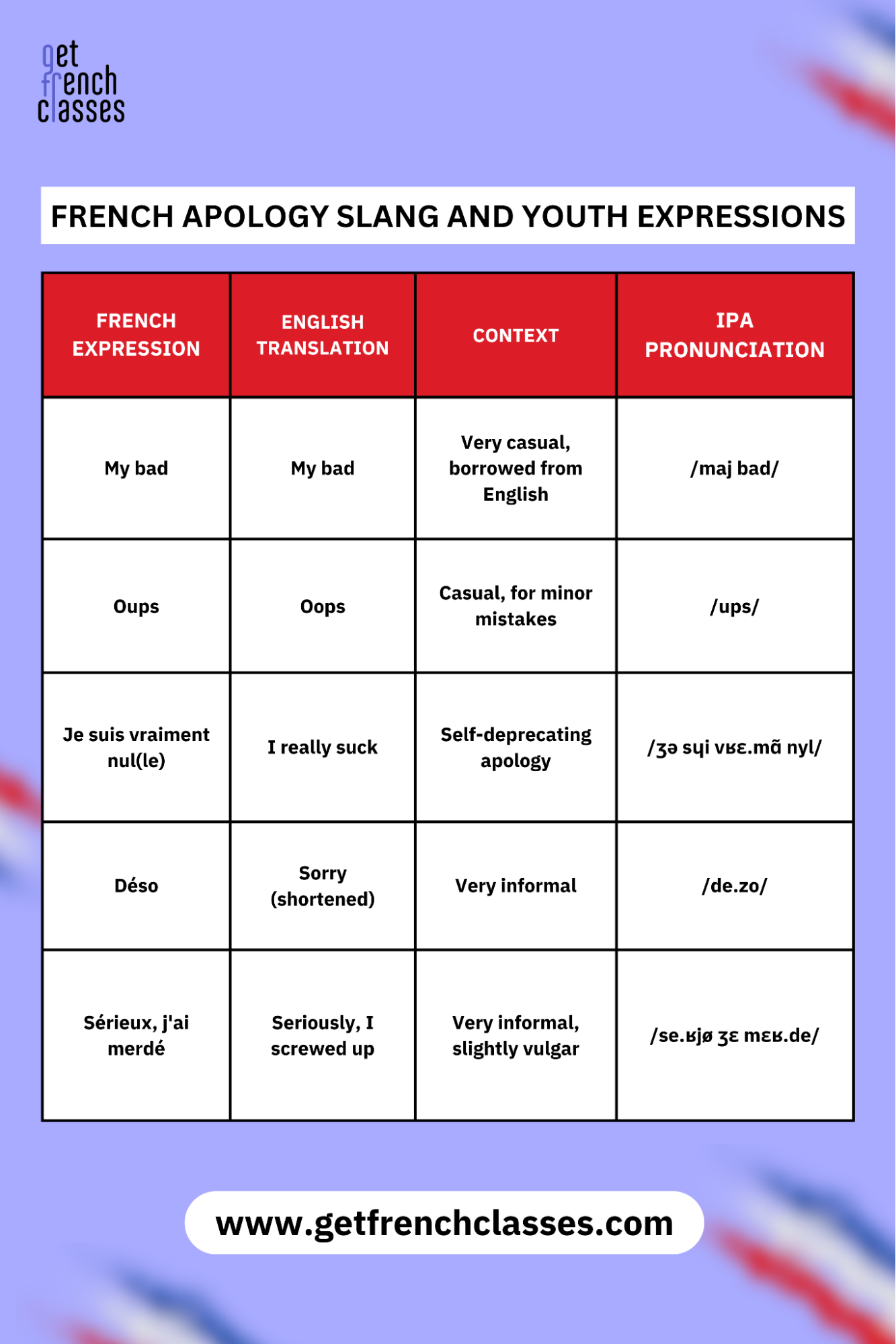
Younger French speakers and those in very casual settings often use slang expressions to apologize. These are informal and should be used carefully, as they may not be appropriate in all contexts.
| French Expression | English Translation | Context | IPA Pronunciation |
|---|---|---|---|
| My bad | My bad | Very casual, borrowed from English | /maj bad/ |
| Oups | Oops | Casual, for minor mistakes | /ups/ |
| Je suis vraiment nul(le) | I really suck | Self-deprecating apology | /ʒə sɥi vʁɛ.mɑ̃ nyl/ |
| Déso | Sorry (shortened) | Very informal | /de.zo/ |
| Sérieux, j'ai merdé | Seriously, I screwed up | Very informal, slightly vulgar | /se.ʁjø ʒɛ mɛʁ.de/ |
Examples and cultural context:
-
Among close friends, after forgetting to bring something:
" My bad, j'ai complètement zappé ! " ( My bad, I completely forgot! )
This Anglicism is popular among younger French speakers, especially in urban areas. It's very casual and should only be used among close friends.
2. Accidentally stepping on someone's foot in a crowded space:
Oups, pardon ! Oops, sorry!
While "Oups" is used by all generations, it's particularly common among younger people as a quick, reflexive apology for minor accidents.
3. Making a mistake during a group project:
Je suis vraiment nul(le), j'aurais dû faire plus attention. I really suck, I should have paid more attention.
This self-deprecating apology is common among French youth. It acknowledges one's mistake while also seeking reassurance from peers.
4. Sending a quick apology text for being late:
Déso, je serai là dans 10 min ! Sorry, I'll be there in 10 min!
"Déso" is a very informal abbreviation of "désolé(e)" used primarily in text messages and casual spoken language among younger people.
5. After making a significant mistake:
"Sérieux, j'ai merdé. Je peux faire quelque chose pour me rattraper ?" (Seriously, I screwed up. Can I do something to make up for it?)
This expression is quite vulgar and should only be used among very close friends. It's more common among young adults and in very informal settings.
Regional ways to say sorry in French-speaking countries
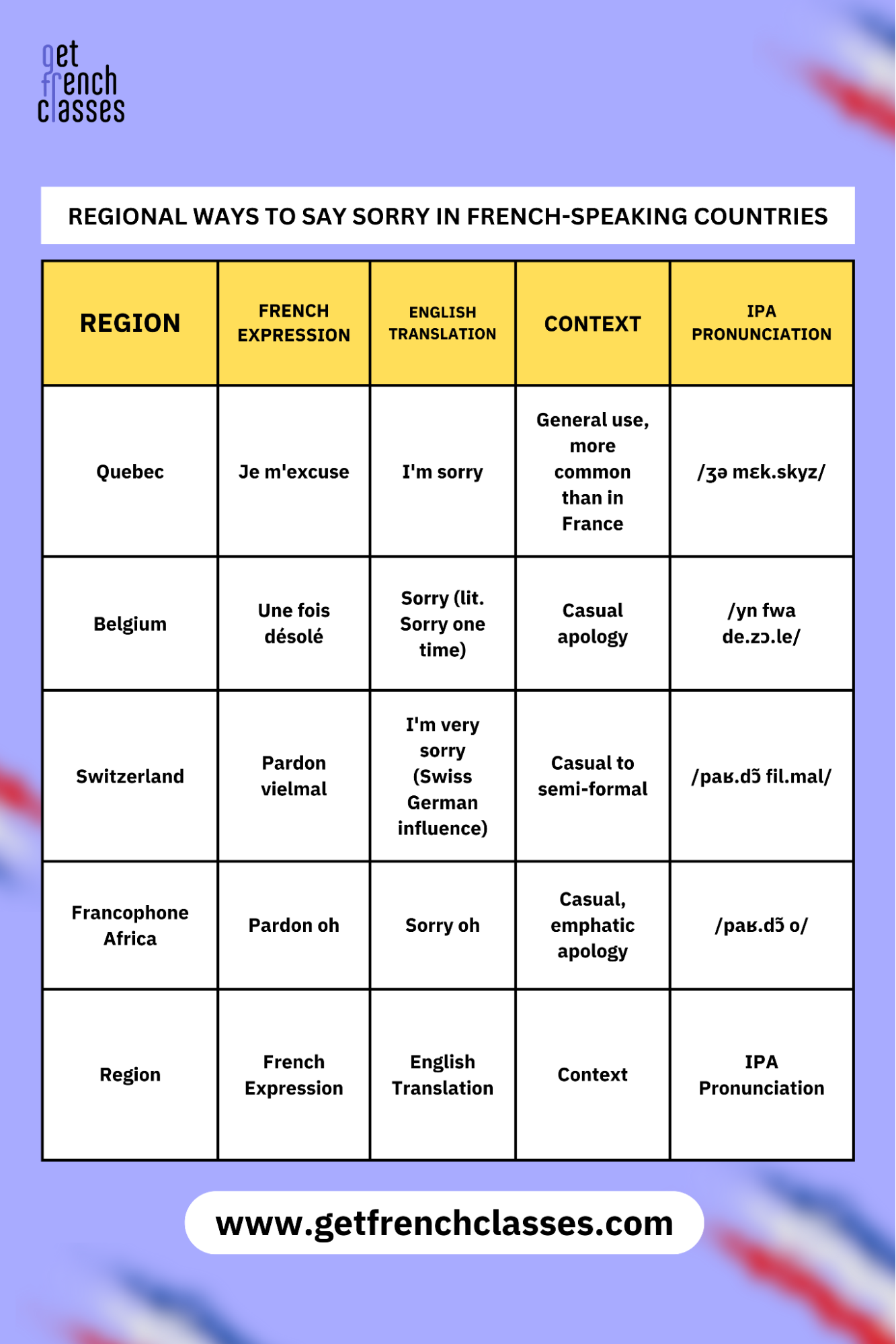
French is spoken in many countries around the world, and each region has developed its own unique expressions for apologizing. Let's explore some ways to say sorry in Canada (particularly Quebec), Belgium, Switzerland, and Francophone Africa.
| Region | French Expression | English Translation | Context | IPA Pronunciation |
|---|---|---|---|---|
| Quebec | Je m'excuse | I'm sorry | General use, more common than in France | /ʒə mɛk.skyz/ |
| Belgium | Une fois désolé | Sorry (lit. Sorry one time) | Casual apology | /yn fwa de.zɔ.le/ |
| Switzerland | Pardon vielmal | I'm very sorry (Swiss German influence) | Casual to semi-formal | /paʁ.dɔ̃ fil.mal/ |
| Francophone Africa | Pardon oh | Sorry oh | Casual, emphatic apology | /paʁ.dɔ̃ o/ |
Examples and cultural insights:
1 - In Quebec: After accidentally interrupting someone Oh! Je m'excuse, continuez s'il vous plaît. Oh! I'm sorry, please continue.
In Quebec French, "Je m'excuse" is much more commonly used than in France, where it's often considered incorrect (as you're excusing yourself rather than asking for forgiveness).
2 - In Belgium: Arriving late to a casual meeting Une fois désolé pour le retard, le tram était en panne. Sorry for being late, the tram broke down.
"Une fois" (one time) is often added to sentences in Belgian French. It doesn't change the meaning but is a linguistic tic characteristic of the region.
3 - In Switzerland: Bumping into someone on the street Pardon vielmal! Ça va? I'm very sorry! Are you okay?
This expression blends French "pardon" with Swiss German "vielmal" (many times), reflecting Switzerland's multilingual nature.
4 - In Francophone Africa (e.g., Côte d'Ivoire): Making a mistake Pardon oh! Je ne vais plus refaire ça. So sorry! I won't do it again.
Adding "oh" at the end of "pardon" is common in many African French-speaking countries. It adds emphasis to the apology.
Sorry expressions in French for specific situations
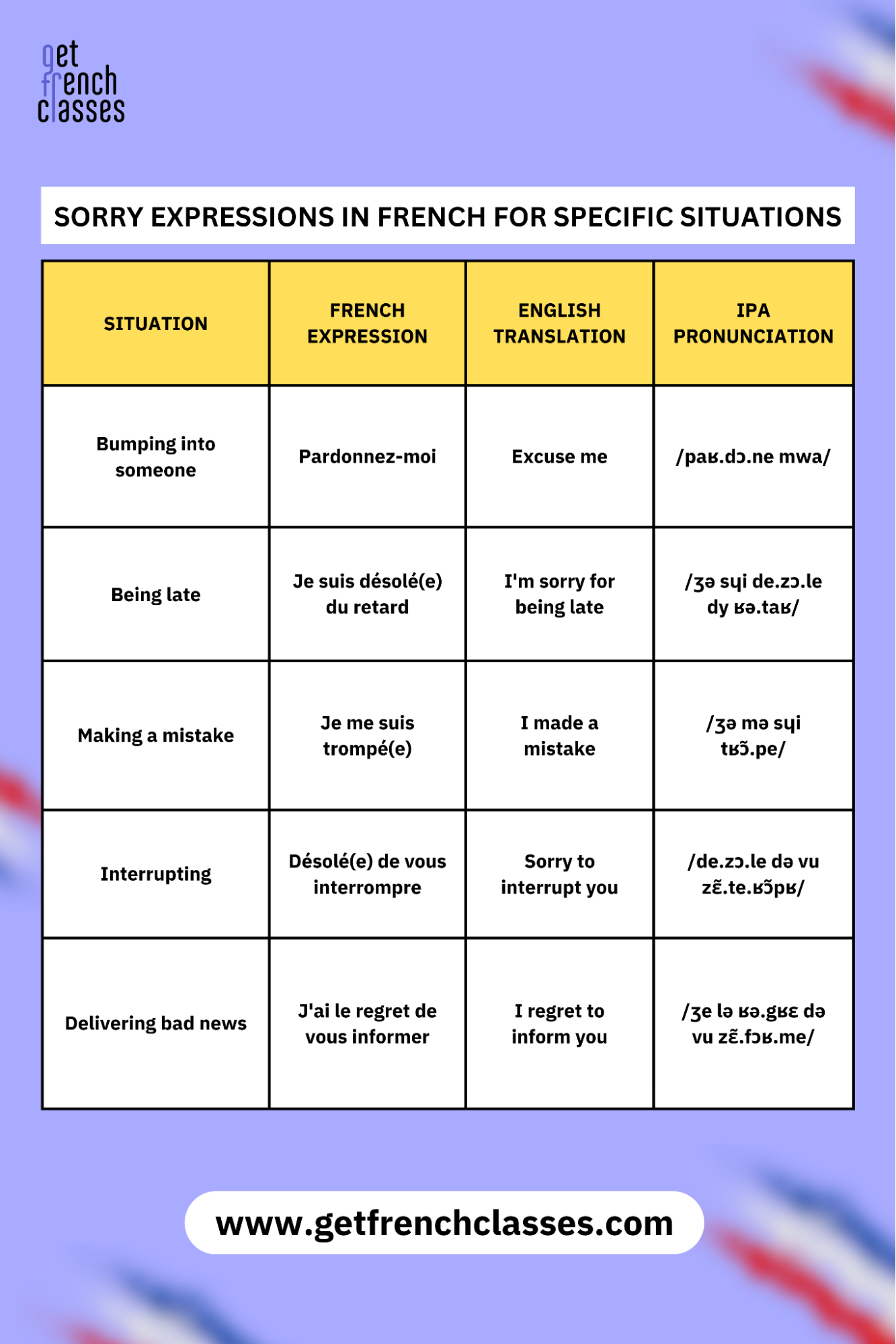
Different situations call for different ways of apologizing in French. Here are some expressions tailored for specific contexts.
| Situation | French Expression | English Translation | IPA Pronunciation |
|---|---|---|---|
| Bumping into someone | Pardonnez-moi | Excuse me | /paʁ.dɔ.ne mwa/ |
| Being late | Je suis désolé(e) du retard | I'm sorry for being late | /ʒə sɥi de.zɔ.le dy ʁə.taʁ/ |
| Making a mistake | Je me suis trompé(e) | I made a mistake | /ʒə mə sɥi tʁɔ̃.pe/ |
| Interrupting | Désolé(e) de vous interrompre | Sorry to interrupt you | /de.zɔ.le də vu zɛ̃.te.ʁɔ̃pʁ/ |
| Delivering bad news (or when french people express sadness) | J'ai le regret de vous informer | I regret to inform you | /ʒe lə ʁə.gʁɛ də vu zɛ̃.fɔʁ.me/ |
Examples and etiquette tips:
-
Bumping into someone:
Oh, pardonnez-moi ! Je ne vous avais pas vu(e). Oh, excuse me! I didn't see you.
Etiquette tip : In crowded places like the metro, a quick "Pardon" is often sufficient. For more significant collisions, elaborate a bit more and make sure the other person is okay.
2. Being late to a meeting:
Je suis vraiment désolé(e) du retard. La circulation était terrible. I'm really sorry for being late. The traffic was terrible. You can also say "je suis sincèrement désolé"(e) instead of "Je suis vraiment désolé(e)".
Etiquette tip : When apologizing for being late, it's good to offer a brief explanation, but avoid lengthy excuses. If possible, send a message in advance if you know you'll be late.
3. Making a mistake at work:
Je me suis trompé(e) dans les calculs. Je vais les refaire immédiatement. I made a mistake in the calculations. I'll redo them immediately.
Etiquette tip : When apologizing for a mistake, especially in professional settings, it's important to acknowledge the error and propose a solution or correction.
Expressing apologies in written French
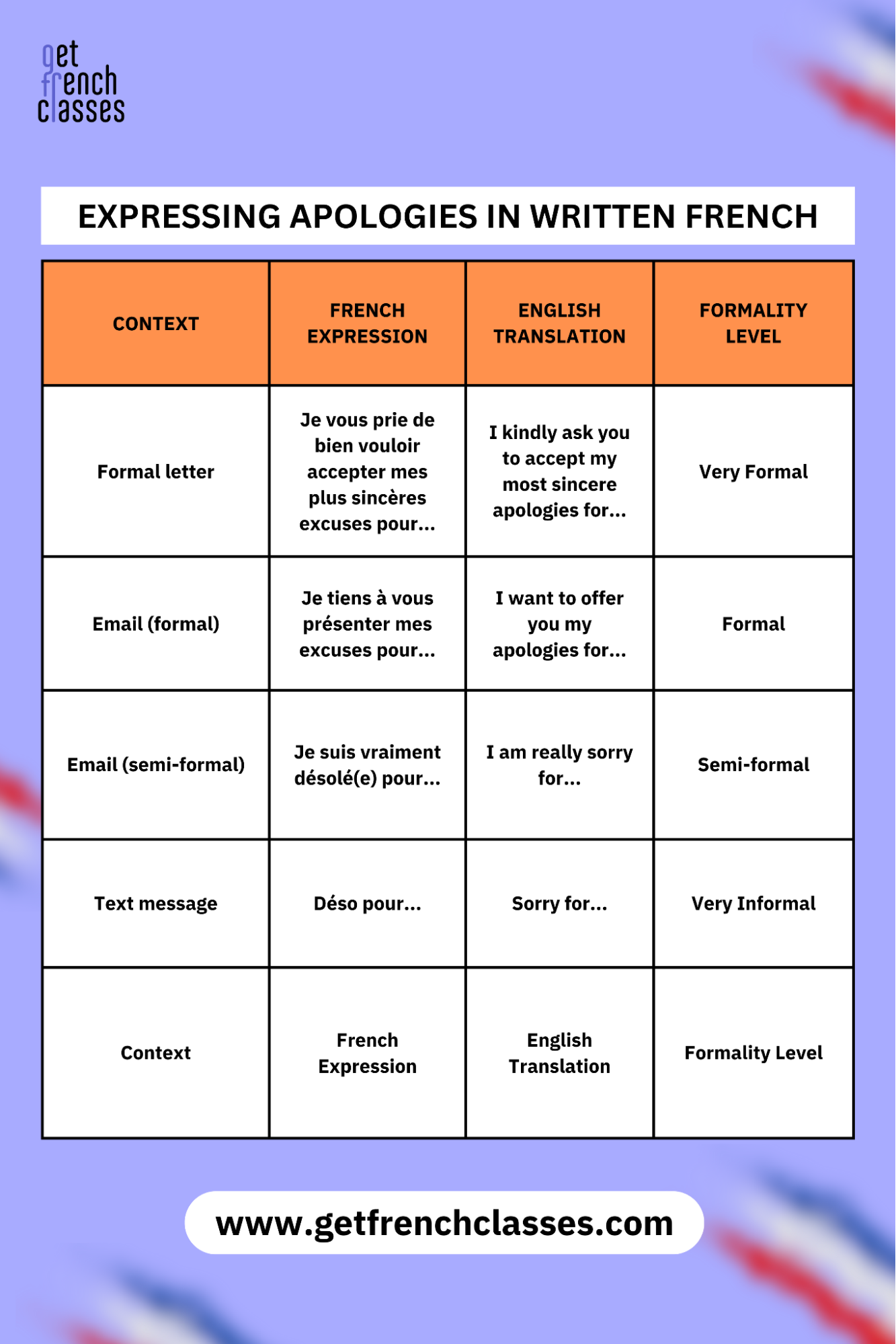
Written apologies in French vary depending on the formality of the communication. Here's how to apologize in letters, emails, and text messages.
| Context | French Expression | English Translation | Formality Level |
|---|---|---|---|
| Formal letter | Je vous prie de bien vouloir accepter mes plus sincères excuses pour... | I kindly ask you to accept my most sincere apologies for... | Very Formal |
| Email (formal) | Je tiens à vous présenter mes excuses pour... | I want to offer you my apologies for... | Formal |
| Email (semi-formal) | Je suis vraiment désolé(e) pour.../Je suis sincèrement désolé(e) pour... | I am really sorry for... | Semi-formal |
| Text message | Déso pour... | Sorry for... | Very Informal |
Examples and cultural context
-
Formal letter apology:
Je vous prie de bien vouloir accepter mes plus sincères excuses pour le retard de livraison de votre commande. Nous mettons tout en œuvre pour que cela ne se reproduise plus. "
( I kindly ask you to accept my most sincere apologies for the delay in delivering your order. We are doing everything possible to ensure this doesn't happen again.
2. Email apology (formal):
"Cher Monsieur Dupont,
Je tiens à vous présenter mes excuses pour mon absence à la réunion d'hier. Un problème familial urgent m'a retenu(e).
Cordialement, [Votre Nom] "
( Dear Mr. Dupont,
I want to offer you my apologies for my absence at yesterday's meeting. An urgent family matter held me up.
Regards, [Your Name] )
3. Text message apology:
Déso pour le retard ! J'arrive dans 10 min. Sorry for being late! I'll be there in 10 min.
How to respond to "Sorry" in French
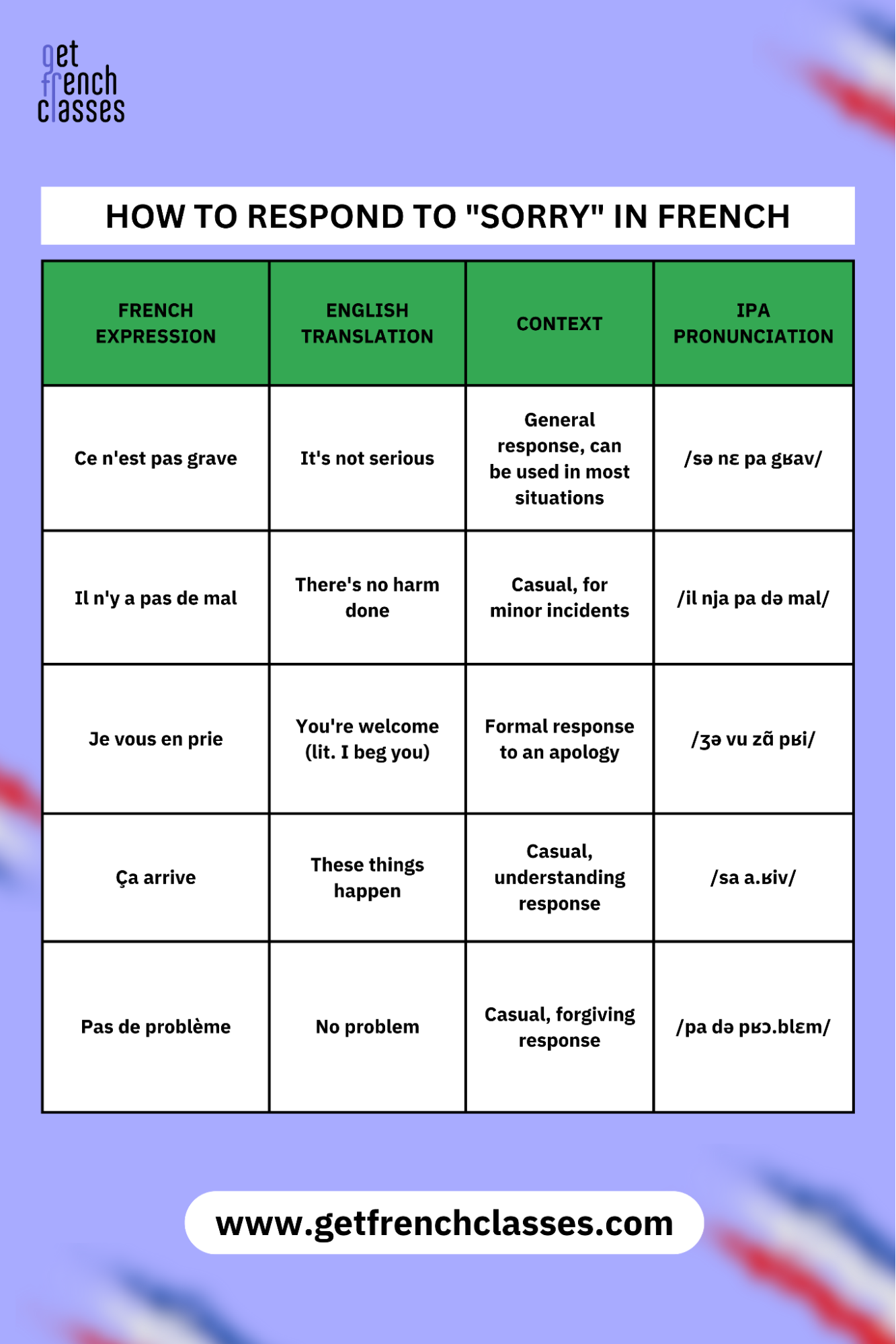
Knowing how to respond when someone apologizes is just as important as knowing how to apologize yourself.
In French language, there are various ways to reply to "désolé" or other expressions of regret, depending on the context and level of formality. Here are some exppressions that french people use to express regret.
| French Expression | English Translation | Context | IPA Pronunciation |
|---|---|---|---|
| Ce n'est pas grave | It's not serious | General response, can be used in most situations | /sə nɛ pa gʁav/ |
| Il n'y a pas de mal | There's no harm done | Casual, for minor incidents | /il nja pa də mal/ |
| Je vous en prie | You're welcome (lit. I beg you) | Formal response to an apology | /ʒə vu zɑ̃ pʁi/ |
| Ça arrive | These things happen | Casual, understanding response | /sa a.ʁiv/ |
| Pas de problème | No problem | Casual, forgiving response | /pa də pʁɔ.blɛm/ |
Examples and usage tips:
-
In a formal setting:
-
Person A : " Je suis désolé(e) pour le retard.
-
Person B : " Ce n'est pas grave. Commençons la réunion. " ( Ce n'est pas grave can be replced by the less formal C'est pas grave)
Usage tip : "Ce n'est pas grave" is a versatile response that can be used in both formal and informal situations. It acknowledges the apology while minimizing the offense.
2. After a minor accident:
-
Person A : " Oh pardon, j'ai renversé un peu d'eau sur votre bureau ! "
-
Person B : " Il n'y a pas de mal, j'ai un mouchoir ici. "
Usage tip : "Il n'y a pas de mal" is perfect for minor incidents. It reassures the person that no harm was done.
3. In a professional context:
-
Person A : " Je vous prie de m'excuser pour cette erreur dans le rapport. "
-
Person B : " Je vous en prie. Assurez-vous simplement de le corriger pour la prochaine fois. "
Usage tip : "Je vous en prie" is a formal way to accept an apology. It's often used in professional or formal social situations.
4. Among friends:
-
Friend A : " Désolé(e), j'ai oublié d'apporter le livre que je devais te prêter. "
-
Friend B : " Ça arrive, tu me l'apporteras la prochaine fois. "
Usage tip : "Ça arrive" is a casual, understanding response. It implies that everyone makes mistakes and helps put the person at ease.
5. In a casual setting:
-
Person A : " Excuse-moi, je suis en retard de 5 minutes. "
-
Person B : " Pas de problème, je viens juste d'arriver aussi. "
Usage tip : "Pas de problème" is a relaxed way to accept an apology. It's widely used in casual situations and among peers.
Remember, in French culture, the way you respond to an apology can be just as important as the apology itself. Your tone and body language play a crucial role in conveying forgiveness or understanding.
A smile and a reassuring tone can go a long way in smoothing over any awkwardness. Also, it's common to add a brief explanation or reassurance after accepting the apology, especially if you want to make the other person feel more at ease.
In more serious situations, if you're not ready to fully accept an apology, you might say something like " J'ai besoin d'un peu de temps pour y réfléchir " ( I need some time to think about it ) or " J'apprécie vos excuses, mais j'ai encore besoin de temps " ( I appreciate your apology, but I still need some time ).
How to say sorry in French FAQ
Here are some frequently asked questions about apologizing in French, along with concise, informative answers:
Is "Je suis désolé" or "Je suis désolée" correct?
Both can be correct. Use "Je suis désolé" if you're a man, and "Je suis désolée" if you're a woman. The extra 'e' in "désolée" is only pronounced in very formal speech. In everyday spoken French, they sound the same.
In a deep regret situation, it could be better to say 'Je suis très désolé(e)."
How do you apologize for your French if you're not fluent?
You can say " Excusez mon français, je suis en train d'apprendre " ( Excuse my French, I'm learning ). Most French language speakers appreciate the effort and will be understanding.
Is it true that the French don't apologize as much as English speakers?
While it's a generalization, French culture does tend to use explicit apologies less frequently than English-speaking cultures, especially for minor incidents. Actions to remedy a situation are often valued more than words of apology.
How do you apologize in a formal email in French?
For a formal apology in an email, you could write: " Je vous prie de bien vouloir m'excuser pour... " ( I kindly ask you to excuse me for... ) followed by the reason. End with "Je vous présente mes sincères excuses" (I offer you my sincere apologies).
What's the difference between "Pardon" and "Désolé"?
"Pardon" is often used for quick, reflex apologies (like when you bump into someone), while "Désolé" expresses more genuine regret. "Pardon" can also be used to ask someone to repeat themselves.
How do French-Canadians apologize differently from the French?
French-Canadians, particularly in Quebec, use "Je m'excuse" much more frequently than in France.
In France, this phrase is often considered incorrect (as you're excusing yourself rather than asking for forgiveness), but it's perfectly acceptable in Quebec.
Is there a French equivalent to the English phrase "I'm sorry to hear that"?
Yes, you can say "Je suis désolé(e) d'entendre ça" or more informally, "Ça me fait de la peine d'entendre ça" (It saddens me to hear that).
How do you apologize for being late in French?
You can say " Je suis désolé(e) pour le retard I'm sorry for being late ) or "Veuillez m'excuser pour mon retard" (Please excuse me for my lateness) in more formal situations.
Are there any gestures that accompany apologies in French culture?
While not always necessary, a slight bow of the head can accompany a verbal apology in more formal situations. In casual settings among friends, touching the person's arm lightly while apologizing can convey sincerity.
How do you accept an apology in French?
Common ways to accept an apology include "Ce n'est pas grave" (It's not serious), "Il n'y a pas de mal" (There's no harm done), or simply "Ça va" (It's okay).
Remember, as with many aspects of language, context is key. The appropriate way to apologize can vary greatly depending on the situation, your relationship with the person, and the severity of the offense.
